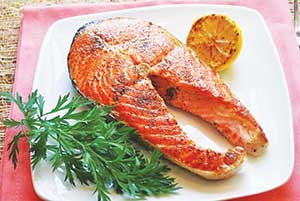When the doctor or nutritionist advises that we take enough fruits, the first names that pop up are banana, apple, pineapple, orange and probably grapes.
However, there are some other fruits available that we ignore probably because we are not sure if they are fruits or due to misconceptions about some of them.
 “Many people would be surprised at the nutritional contents of these fruits. Take guava, for instance; it contains four times the vitamin C content in oranges, but vitamin A and C in the African star apple (udara in Igbo, agbalumo in Yoruba) is the highest,” explained Tosin Omodun, a nutritionist.
“Many people would be surprised at the nutritional contents of these fruits. Take guava, for instance; it contains four times the vitamin C content in oranges, but vitamin A and C in the African star apple (udara in Igbo, agbalumo in Yoruba) is the highest,” explained Tosin Omodun, a nutritionist.
The fruit market at Tipper Bus stop, Ketu in Lagos, is one place you can always get these fruits which go mostly by Yoruba or English names.
Soursop
Soursop is the fruit of Annona muricata, a broadleaf, flowering, evergreen tree native to Mexico, Cuba, Central America, the Caribbean islands of Hispaniola and Puerto Rico, and northern South America, primarily Colombia, Brazil, Peru, Ecuador and Venezuela. It is also produced in some parts of Africa, especially in Eastern Nigeria, Southeast Asia and the Pacific. It is in the same genus as the chirimoya and the same family as the pawpaw.
“For me, the shape of soursop is enough to (make someone) not see it as a fruit; but since tasting it, I have vowed to always be on the lookout for it,” revealed Nike Fajana, a fashion designer.
Soursop’s green skin is thin and covered with conical nibs that are slightly soft. You can enjoy the white, pulpy flesh. This flesh contains juice and small shiny, black inedible seeds.
With an appetising flavour, soursop has a sweet-acidic taste. This healthy fruit can be juiced and taken especially when you are fasting because it is believed to relieve liver ailments.
Velvet tamarind
This fruit is known as awin in Yoruba, icheku/nchichi in Igbo and tsamianbiri/tsamiyarkurm in Hausa. It is a favourite among children who break the brown hard inedible shell that has a velvety feel to enjoy the orange coloured pulp with a powdery texture inside.
With its sweet and sour taste, tamarind is very cheap and is sold by market women who bring in their produce directly from the rural areas. It is usually sold either still on the stem or measured with cups.
Star apple
When star apple popularly known as cherry (agbalumo in Yoruba and udala/udara Igbo), is in season, you cannot miss it. Buyers will surround the basketful of ripe cherry to select, even as the sellers lure them with free samples.
It has a bright orange/brown colour with edible flesh and dark brown seeds covered with creamy pulp which is usually eaten up.
The unripe cherry is sour, while most of the the ripe fruits, which usually drop naturally from the tree, are very sweet.
“When I was younger, we used the seed as arithmetic aid as well as for playing games like suwe and ayo. Then you could chew the flesh and skin so hard it turned to gum,” reminisced Funmi Onasanya, a banker.
Guava
“What actually put me off guava are the hard, tiny seeds inside it. We were made to believe that it can cause appendicitis if swallowed,” revealed Shola Olatunji, a student.
Despite this misconception, this round/oval fruit is still enjoyed by some people who would rather chew and spit out the seeds. The outer skin may be rough, often with a bitter taste, or soft and sweet. The pulp inside may be sweet or sour and off-white to deep pink.
African bush mango
This fruit (known as oro in Yoruba and ugiri/ugili in Igbo) looks like mango but is smaller in size. It is mostly cherished for its fat and protein-rich nuts which after being dried in the sun are ground to cook ogbono soup.
Cashew apples
The cashew apple is the fleshy part of the cashew fruit that is attached to the cashew nut. It ripens into a yellow and/or red fruit with a strong ‘sweet’ smell and a sweet taste.
Care must be taken when eating cashew as the liquid can cause skin irritation and also stain clothes which may not come off again.
The cashew seed is served as a snack after roasting.













